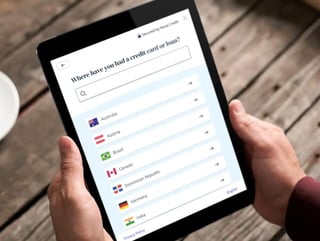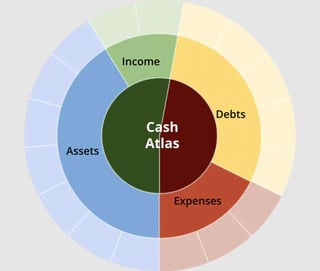
Our experts and industry insiders blog the latest news, studies and current events from inside the credit card industry. Our articles follow strict editorial guidelines.
In a Nutshell: Consumers with access to reasonably priced credit have more opportunities for financial improvement. But the three major US credit bureaus tend to reward consumers who have what they consider appropriate credit-use records and exclude many others, including immigrants and infrequent credit users. Nova Credit helps financial providers assess the creditworthiness of millions who don’t fit the conventional mold. It accomplishes that by analyzing alternative data from international credit bureaus and domestic bank transactions to allow providers to boost credit access.
In the United States, the FICO score rules the credit world, with up to 90% of top lenders using it to qualify consumers for credit. The FICO score and the three major credit bureaus power most credit decisions in the US.
But a contradiction at the heart of the system fundamentally dampens the economy. Consumers without strong credit-use records tend not to qualify for the most affordable credit options, and therefore, are less likely to use credit to purchase goods and services.
Many credit-excluded consumers are newcomers to the US. Millions living and working in America haven’t accumulated enough US credit data to generate good FICO scores.
Many more have fallen between the credit cracks because they don’t use credit in conventional ways. They’re either disinclined to use credit frequently in the manner FICO and the bureaus prefer, or they’ve suffered from mistakes on their credit report, which are very common and consign individuals to higher-interest products.

Nova Credit addresses these problems by helping newcomers to the US qualify for affordable financial services. Over the past five years, the company has built partnerships in over 20 countries to gain consumer-permissioned access to over a billion credit profiles. This network provides lenders the ability to assess the creditworthiness of US newcomers to issue financial products like credit cards, loans, phone plans, and more.
Beyond newcomers, Nova Credit also helps credit-excluded domestic consumers qualify for better credit by helping them unlock alternative financial data and transactional bank data, which enable lenders to see a more complete picture of any applicant, not captured by the traditional credit report.
“We transform alternative financial data into structures the credit industry can use,” said Sarah Davies, Chief Data and Analytics Officer at Nova Credit. “Through our strong analytic techniques, we’re finally solving the problem of credit exclusion.”
Credit Passport® Draws on International Credit Data
The founders of Nova Credit were international graduate students at Stanford University who realized, when they arrived on campus, that more than 50% of their class couldn’t access credit because they were immigrants.
Nova Credit’s first product, Credit Passport®, is its solution to the lack of credit access experienced by consumers living and working outside their home markets. Through an API, lenders can access international credit data, translated in real-time to a standardized credit report, that includes a US-equivalent score, summary attributes, and trade line information.

Nova Credit has a marketplace to connect credit-excluded US newcomers to fintechs and other businesses who use their solutions. They also works directly with businesses to embed their solutions into their products to meet consumers where they need it most. Both pathways allow Credit Passport to act as an entryway to better credit access for foreigners moving or living in the US.
This is a win-win for both newcomers and for the US economy. As a country that hosts more than one million immigrants arriving every year as permanent legal residents, this provides them access to the resources they need and accelerates financing and economic activity.
“The misperception about these international consumers is that if we don’t have data on them, they must be in the high-risk category, and the reality is they’re not,” Davies said. “As we analyze the credit-excluded population, we find that 60% to 70% are prime or higher.”
That means better pricing and more diverse product access for consumers predisposed to participate more fully in the digital financial economy.
“It’s to the consumer’s benefit to step into these kinds of solutions, and we’re actually seeing that happen,” Davies said.
Cash Atlas™ Qualifies Excluded Domestic Consumers
A larger problem exists with millions of domestic US consumers who struggle to access the US credit system given a lack of strong (or any) credit history. These are consumers who either choose not to carry multiple accounts or don’t use credit as frequently as the bureaus stipulate. They are also credit newbies who are starting from scratch or they are consumers who have had a credit setback or error and need to rebuild.
After the financial downturn of 2007-08, it’s not too much to say that a significant number of Americans grew disenchanted with the system and sought to remove themselves from it entirely.

Many have come to realize that strong credit history is essential when it’s time to make a large purchase such as a home or car.
Through its partners, Nova Credit aims its Cash Atlas™ product at that vast population of potential credit consumers. Unlike Credit Passport, which links with international credit bureau data, Cash Atlas™ is a first-party cash flow underwriting solution that transforms bank transaction data into a Fair Credit Reporting Act (FCRA) consumer report, informing businesses’ lending decisions by painting a more holistic view of consumers’ financial health.
Income is the most significant determinant because it can demonstrate whether the consumer can afford to make payments. Bank balances and trends come next — whether balances are increasing or decreasing, volatile or stable — because they are potent determinants of risk.
The quality and caliber of expenses is another important category. A large-dollar recurring expense typically indicates a mortgage, which is a positive. But non-recurring expenses and other instabilities in the way consumers manage their expenses and cash flows are red flags. For Credit Passport® and Cash Atlas™, the goal is the same.
“We’re bringing the data into structured reports so the lenders can make decisions,” Davies said. “Our analysis ensures the data is accurate and usable within each lender’s environment.”
Nova Credit: Bridging Gaps in the Financial System
Bank statement reporting works because 95% of US consumers have a bank account. Nova Credit increases access to lower-cost credit for millions outside the scope of the traditional score and bureau system.
Nova Credit’s premise is that access and mobility benefit the economy. As a partner to financial providers on the leading edge of innovation, Nova Credit improves risk assessment so providers can originate more loans and reduce testing cycles while maximizing predictability. Nova Credit’s customers include card issuers such as American Express, auto and personal loan providers like Autonomy, mobile providers like Verizon, and others interested in accessing consumer-permissioned bank data
While the recession of 2007-08 brought many negative consequences, it also spurred innovation in credit decision-making, and Nova Credit is a beneficiary and an example of that.
“We’ve learned a lot about managing our models, and we have boundaries in place to ensure we have a safe structure around these new solutions,” Davies said.
The next step is to connect the markets Nova Credit serves to each other in a many-to-many model. In a way, it’s a corporate attempt to globalize the credit system, with Nova Credit solving compliance and privacy dynamics along the way.
Although the US credit bureaus have significant ownership stakes in many international bureaus falling under Nova Credit’s purview, Davies sees regulatory complexity as an impediment to credit unity. But as Nova Credit bridges more market gaps in the system, it becomes more capable as a business of doing what governments probably can’t.
“Nova is betting on a global, consumer-permissioned platform,” she said. “If we’re to overhaul what is now a fairly archaic system, we have a responsibility to put the right thought leadership and intellectual engagement into the problem so we can retire this notion of financial exclusion once and for all.”

![21 Startling Credit Card Data Breach Statistics ([current_year]) 21 Startling Credit Card Data Breach Statistics ([current_year])](https://www.cardrates.com/images/uploads/2023/10/Credit-Card-Data-Breach-Statistics.jpg?width=158&height=120&fit=crop)


![Walmart Credit Card: Bad Credit OK? ([updated_month_year]) Walmart Credit Card: Bad Credit OK? ([updated_month_year])](https://www.cardrates.com/images/uploads/2016/01/Walmart-Credit-Card.jpg?width=158&height=120&fit=crop)
![9 Best Credit Cards For Rebuilding Credit ([updated_month_year]) 9 Best Credit Cards For Rebuilding Credit ([updated_month_year])](https://www.cardrates.com/images/uploads/2017/07/rebuildcredit.png?width=158&height=120&fit=crop)
![9 Expert Solutions: Build Credit Without a Credit Card ([updated_month_year]) 9 Expert Solutions: Build Credit Without a Credit Card ([updated_month_year])](https://www.cardrates.com/images/uploads/2018/05/without2.png?width=158&height=120&fit=crop)
